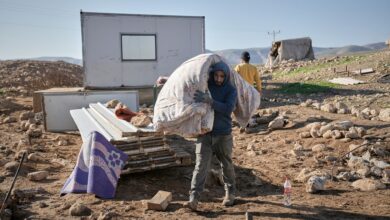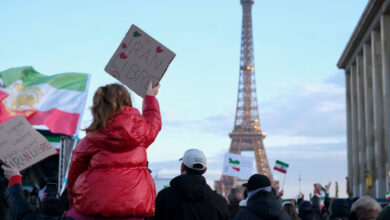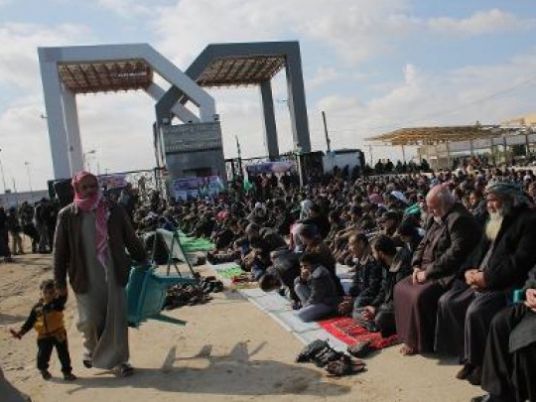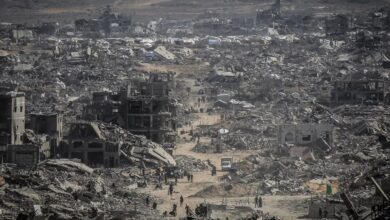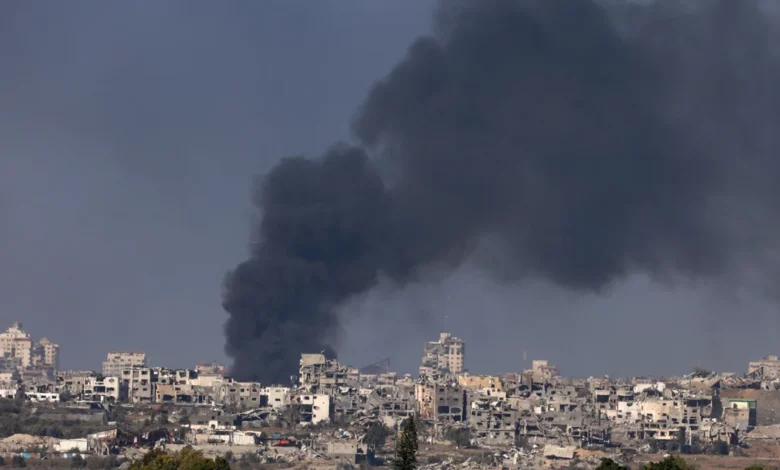
It was a delicious dinner at the Stanford Estate, about an hour north of London. The sumptuous dinner was hosted and organized by David Turnbull, a well-known philanthropist, global investor and writer.
The ground hall where the dinner took place had a 15-foot ceiling with a glass dome and wooden marquetry around it with multiple works of art.
The long table seated about 36 guests. I could identify guests from America, Germany, China, Russia, Ukraine, Israel, Saudi Arabia, Palestine, Algeria, Morocco, Iran, Bahrain and the UK. Some I could not identify, but they could have been from Turkey, Indonesia and Brazil.
Each guest had a name card ahead of them with a country named below, though I could not read except for the cards of the persons sitting around me.
David, at the end of the dinner, gave an insightful speech providing an overview of the state of the world both economically and politically. David’s overview was a true tour de force: focused, practical, emotionless and both detailed and well organized.
Everyone listened intently.
When David finished, clapping broke out. The person five seats away from me got up, identified himself as Wolfgang Lutz from Germany, a former Cabinet member, and said he was not certain how the Ukraine-Russia war would develop and the impact of the economic distortions it is causing.
The gentleman sitting beside me, Gabriel Santos from Brazil, whilst tapping the fingers of his right hand, muttered: “The US-Russia war, not Ukraine”.
A woman beside him touched his arm and suddenly got up. I peered to catch her name, but she said: “David, thank you for this excellent event as every year. For those who do not know me, I am Niamh McGwan from Ireland, and in brief, I want to predict that given what David has described as the state of the world, I see we are heading into the abyss with our leaderless, incompetent politicians.”
Niamh, a tall redhead with long hair and a black dress had all the room’s attention. As suddenly as she stood up, she sat again.
David thanked her and suggested that we move to the Grand Salon for cigars, brandy and cognac – a British tradition.
As we shuffled from the Grand Dining Room to the Grand Salon, we were welcomed with amazing portraits, chandeliers and pieces of exquisite art everywhere. Most of the art had plaques explaining the piece and introducing the artist. I noted as I walked across artists from Mongolia, South Africa, Chile, Sudan and much more.
The group broke up. Some congregated around David, others were staring at the portraits, and another group was around the bar whilst a few sat in a corner, all drinking pink champagne and in a heated discussion.
I approached a group of five people standing near a beautiful 19th-century fireplace. I introduced myself and was introduced to Yulia Petrova, a Ukrainian model living in Paris, and Alexander Orlov, a Russian banker living between Moscow and Zürich.
Both Yulia and Alexander were six feet plus, she in a Prada dress and he in a dark double-breasted suit and a crimson tie.
Beside them stood Salih Sait, a famous Turkish political writer and Jamila Saiid, an Algerian businesswoman in the energy business.
Alexander stressed that Russia would not rest until Ukraine accepted not to join NATO and to dismantle US military weapons aimed at Moscow. Yulia said Russia cannot dictate what Ukraine is to do. The argument went on as Salih attempted to find common ground between them.
Jamila spoke of the mistreatment of Russians in Ukraine and reminded Yulia that a missile from Ukraine can hit Moscow in 90 seconds. Yulia shook her head and almost walked away, but Salih said to Yulia: “Do you remember the Cuban crisis?”
Salih explained in detail the history and how America refused to allow missiles from the USSR in Cuba 60 years ago when missile technology was easy to defend from, unlike now.
Alexander added that Russia had no quarrel with Ukraine, but that this war killing Ukrainians and Russians is an American war to bleed Russia so America can focus on China.
Yulia was not convinced and walked towards the bar with many eyes following her, and definitely not for political reasons.
I crossed beyond a beautiful wooden table with multiple etchings and a large sculpture of bronze galloping horses to a group of seven people standing in a circle.
I introduced myself, and there was an Indonesian businessman whose name I failed to catch, a Chinese man, Wang Fu Jin, the head of a think tank, and a Saudi, Mohammed Janahi, a wealthy government official who was talking in the billions.
To my left was Tom Cotton, an American businessman who owns casinos in the US and abroad. To his right stood two ladies and a gentleman: Susan Marie Pritchard, an American heiress with a significant portfolio of philanthropy in the medical field in Africa, Asia and Latin America. Zahra Mishriky, a Moroccan owner of a famous global brand of cosmetics, shampoos and skin treatment creams.
I could not identify the last gentleman, who was quietly sipping his drink and staring away, seemingly uninterested. He looked Latin, but when I introduced myself, he shook hands but said nothing.
The conversation in this group was diversified.
Jin and Cotton were bashing each other politely. Cotton complained about the Chinese stealing US technology, while Jin argued that sanctions against China, condemning the Belt and Road initiative and instigating conflict by igniting Ukraine, Taiwan and Israel are all roads to conflict.
Mishriky sided with Cotton and the Indonesian sided with Jin.
Janahi remained neutral, and the silent person unexpectedly said: “We must eliminate the Palestinians, Hezbollah, Iran and North Korea so that we may be safe”.
He added: “We should not hesitate for a second; we need to eliminate these peoples by whatever means and start by eliminating all the Palestinians.”
His accent and wishes reflected that he must be an Israeli, which he admitted later as he explained he was a billionaire tech owner.
The air was strained but before I could respond, Susan Marie Pritchard said in a calm but focused and decisive voice: “Young man, you have a big chip on your shoulder, and your heart and mind are distorted.”
She added: “If you are unable to live as a human being amongst people without being harmful, why don’t you and the likes of you move to the desert in Nevada and set up camp away from the world you hate so much.”
As the man whose name later I learnt was Efraim Havely took one step towards Susan, I stepped in between them and said: “All of us are entitled to our opinion although killing children and women is something all rational people would condemn and not condone.”
I turned and walked towards the group sitting and having the champagne.
They were discussing the economy and how all the distortions, sanctions, supply chain problems, high cost of money, inflation and global debt are messing with the market and creating chaos.
One gentleman, obviously British, said that the world will slow down in 2024, a recession is coming, and that Britain exiting the EU was a big mistake.
It was another boring and depressing discussion. I spotted Philipe Rosenvallon, a well-known mining expert, investor and TV personality. I walked towards him.
We both exchanged pleasantries as we had not seen each other since the conference in Brussels last year, which focused on gold. I found that event a learning experience.
I realized I knew little about gold and its present manifestations.
Philippe was not in a good mood. He explained that the Iranian stigma, the barbaric Hamas, Israel undertaking genocide, Ukraine fighting an unnecessary and losing war with Russia sacrificing its military, Libya and Sudan disintegrating, China and America unable to coexist, Africa in turmoil, Morocco and Algeria in a silent war, Sierra Leone in chaos and much more, all showcase a loss of leadership and reason.
Philippe took a long sip of his drink, crossed his legs and reflected: “Is there any leadership considering poverty, climate, homelessness, lack of food, health, education… no……spending on arms…. Yes….. encouraging war…. Yes….. destroying humanity…… yes.”
David joined us. He looked tired. It must have been exhausting entertaining 35 guests from around the world.
As Philippe, David and I were discussing medical research and global medical cooperation, a subject we are all interested in, a young woman and a young gentleman approached. We stood up.
The young lady was Professor Hannan Ismail, a Palestinian political scientist teaching in the UK and the occupied territories. The gentleman was a Singaporean owner of a chain of hotels, Lee Tong.
We were shocked to learn that Hannan had just lost two of her cousins, 14 and 16 years old, during indiscriminate Israeli bombing of Khan Younis units in Gaza. Though Hannan’s face was of stone, her heart and mind were throbbing. She reaffirmed that the world has become barbaric from all sides, and our veins have ice as we watch America vetoing a ceasefire and urging Israel to minimize civilian casualties, a manner and policy that strips America of its morals, values and any voice in the arena of human rights.
Lee mentioned he sold his two hotels in Israel as there is no valid excuse to murder in cold blood over 6,000 children.
I quietly interjected and said: “For two decades, I have been telling my Israeli and American friends that the permanent occupation, the checkpoints, the imprisonment of children for throwing rocks, the humiliation from the IDF and the settlers, the encroachment on the Palestinian religious sites and destruction of Palestinian property plus the open air Gaza prison is nothing but a disaster waiting to happen.”
Hannan responded: “And if Netanyahu believes this will wipe out Palestinian resistance, he is very mistaken. This will give birth to more rage and worse consequences regardless of how time passes.”
Philippe shuffled in his seat and said: “Now do you believe me that our global leaders have lost all reason? Not only have they lost all reason,” he continued, “they are – the politicians – unable to see the need for grand design deal-making. The age of political step-by-step is dead.”
David asked: “Philippe, give us some real-life examples.”
Philippe responded: “For Ukraine and Russia, the solution is a great design deal that consists of the following components:
- A ceasefire in place
- An exchange of prisoners
- Humanitarian aid to enter the areas of conflict.
- Russia to de-mine the Ukrainian part of the Black Sea and allow complete export of Ukrainian grain.
- US and EU to remove sanctions against Russia.
- EU to freeze Ukrainian entry into the EU for 10 years.
- Russia agrees to withdraw to 24th February 2022 lines provided Ukraine commits by global treaty not to join NATO and be totally neutral with no Western armament, training or intelligence and no Russian political interference.
- Russia and the US, Ukraine, EU etc. accept the results of a transparent, globally observed, legally binding referendum in the Donbas and Crimea to join Russia or Ukraine. This is to take place within 120 days of the ceasefire.
- The US and NATO freeze completely the expansion of NATO, and Russia commits to its legal boundaries and the results of the referendum.”
Hannan and Lee expressed interest. “This can be a framework,” David remarked. Hannan looked at Philippe and asked: “What about the Israeli-Palestinian conflict?”
He moved forward in his seat and said: “For Israel and the Palestinians, the reasonable solution is:
- Creating a demarcation line protected by UN multinational peace forces, south of Khan Younis. He pulled out his phone with a map of Gaza.
- The area between the demarcation line and the Egyptian border will be a no-fly zone with no military activity, whilst Hamas would lay down its arms in that zone and allow for UN inspections, and Israel would stop its military operations beyond that point.
- Egypt would have access to provide humanitarian aid, medical supplies and human assistance (a significant number of large trucks from Egypt carrying humanitarian and medical aid remain at the border with Gaza, not being allowed in by Israel).
- Egypt would also receive the wounded, women and children on a temporary basis.
- Immediate release of all hostages, provided Israel will commit to launching negotiations with the Palestinian authority, mediated by the US, Egypt, Jordan and Saudi Arabia, with the objective of reaching, in no longer than six months, a two-state solution, in which the Palestinian side would be:
- A – Governed by Palestinians in its entirety – no outside power
- B – Demilitarized
- C – Economically supported for the first seven years
Philippe added: “None of what I said defies reason, none of it defies rationality, none of it defies wisdom, but without any of this, we will continue in the dark tunnel of chaos, and what will come will be worse.”
“What I presented is grand deal-making where not one party wins all, but it is in its core win-win. However, politicians don’t know how to do that,” he concluded.
We stayed silent for a moment as Philippe stopped talking.
Servers came with canapés, we all declined, and other guests came to thank David and bid their goodbyes.
I got up, ready to leave, depressed that some of us could see a path to humanity whilst some leaders govern by their ego, political ideologies, power, money and dictatorial capabilities (a veto is a dictatorial tool) instead of pursuing a humane path.
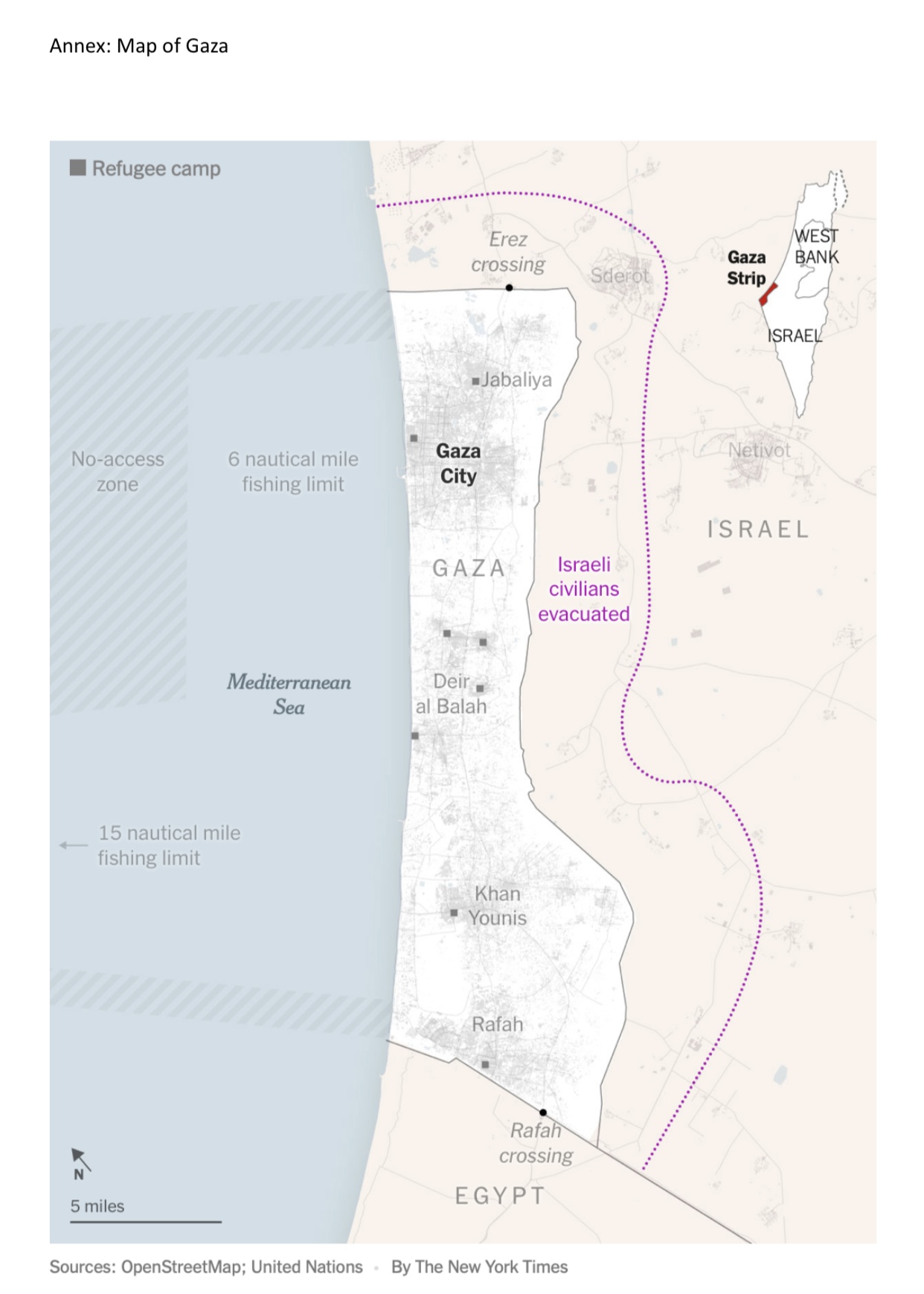
About the author
M. Shafik Gabr is a renowned leader in international business, innovation, investment and one of the world’s premier collectors of Orientalist art, and an accomplished philanthropist.
During his career, Gabr established over 25 companies plus three investment holding companies including ARTOC Group for Investment and Development which, established in 1971, is a multi-disciplined investment holding company with businesses in infrastructure, automotive, engineering, construction and real estate, over the past three years focusing on investment in technology and artificial intelligence.
Gabr is the Chairman and a founding member of Egypt’s International Economic Forum, a member of the International Business Council of the World Economic Forum, a Board Member of Stanhope Capital, an International Chairman of the Sadat Congressional Gold Medal Committee, and a Member of the Parliamentary Intelligence Security Forum. Gabr is a Member of the Metropolitan Museum’s International Council and serves on the Advisory Board of the Center for Financial Stability, the Advisory Board of The Middle East Institute, and the Global Advisory Council of the Mayo Clinic.
Through the Shafik Gabr Social Development Foundation, Gabr is helping to improve elementary-school education in Egypt, introducing students to arts and culture and promoting sports and physical fitness for youth. The Foundation has its first Medical and Social Development Center in Mokattam, Cairo, offering free medical and health services. In 2012 Gabr established in the US the Shafik Gabr Foundation which supports educational and medical initiatives plus launched in November 2012 the ‘East-West: The Art of Dialogue initiative promoting exchanges between the US and Egypt with the purpose of cultural dialogue and bridge-building.
Gabr holds a BA in Economics and Management from the American University in Cairo and an MA in Economics from the University of London.

